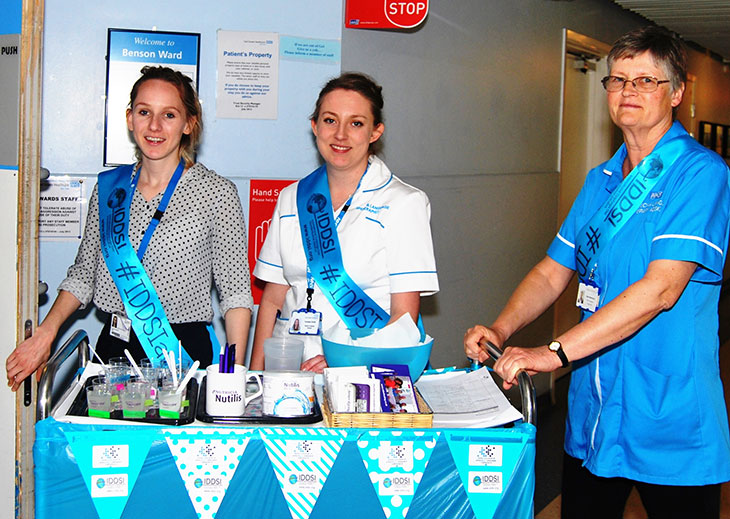We are implementing a new way of classifying modified foods and fluids for people who have swallowing difficulties, in line with recommendations from the Royal College of Speech and Language Therapists (RCSLT).

Speech and Language Therapists visit wards to spread the word about new classification of modified foods and fluids
The Trust is an early implementer for introducing this approach for both acute and community services, and spearheading the one-year phased implementation, which will be adopted nationally by all healthcare providers by 2019.
The new guidelines – the International Dysphagia Diet Standardisation Initiative (IDDSI) – have been developed to make sure that the labels and measurements of fluids are precise and consistent, which will increase the safety for people who have dysphagia and cannot swallow normally.
The Trust’s approach has been recognised as an example of good practice, in the Royal College of Speech and Language Therapists and British Dietetic Association joint statement. The Trust will be presenting its work at a national nutrition conference next month, hosting a national webinar and also attending an international conference later in the year. This will be to share its experience of implementing,what is a large scale change project, so that other trusts around the UK can learn from this experience. The new IDDSI guidelines will be launched across the Trust this month.
Anita Smith, Consultant Speech and Language Therapist said: “Given that this is a global project, we’re thrilled to be recognised as an exemplar service by the RCSLT and an ‘early implementer’ sharing our experience and the lessons we learnt throughout the process with other trusts across the country. Our service reaches out to 243 care homes, our acute and community hospitals and many people in their own home, who may have swallowing difficulties.”
The new guidelines will apply to a wide range of organisations including manufacturers of modified diet foods, caterers, care homes, pharmacies and health providers. The Trust will be working with patients, GPs, hospital and care home staff, to let them know about the new way of classifying modified foods and fluids, to ensure that patients with swallowing difficulties are aware of the changes.
Swallowing problems can occur at any stage of life. Many people have swallowing difficulties after a serious incident such as a stroke, or as part of a life limiting disease, or just as part of getting older, and supporting them to eat and drink safely is a vital part of their healthcare needs.
